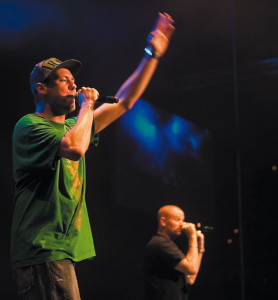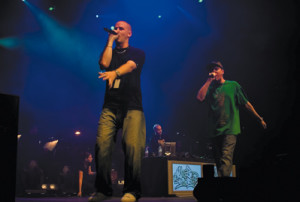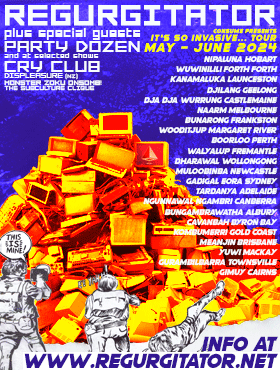HILLTOP HOODS .. with Strings Attached
June 13, 2007 | Author: Andrew James
 When it comes to Australian hip hop, there’s the Hilltop Hoods and everyone else. Very few heads would argue against the Hoods’ domination of the local scene. The $64,000 question is where do they go from here? The long answer would take more words than there’s room for here, the shorter one is an orchestra. After the critical and commercial success of most recent album The Hard Road, they set about remixing, with the help of the Adelaide Symphony Orchestra. Pressure from the group sat down to talk about the trials and tribulations of getting outside their comfort zone. Andrew James reports.
When it comes to Australian hip hop, there’s the Hilltop Hoods and everyone else. Very few heads would argue against the Hoods’ domination of the local scene. The $64,000 question is where do they go from here? The long answer would take more words than there’s room for here, the shorter one is an orchestra. After the critical and commercial success of most recent album The Hard Road, they set about remixing, with the help of the Adelaide Symphony Orchestra. Pressure from the group sat down to talk about the trials and tribulations of getting outside their comfort zone. Andrew James reports.
How did Restrung first come about?
Um, we got approached by ASO early last year, to do some sort of live project with ‘em. We were a bit busy at the time so we had to unfortunately decline it, but we got the idea in our heads that we’d really like to work with an orchestra, but on our own terms. When the ARIAs came around last year we got asked to play at them, we wanted to do something a bit different. So we got a local guy that was working with ASO at the time by the name of Jamie Messenger to compose a string quartet to go on stage with this. We really liked the way he worked strings into the track, so we got him to compose a string quartet for the entire album. We took it on tour with us over New Year’s to the two Falls Festival shows and Southbound over south of Perth for the whole show and it went really well. We were planning on releasing a remix album of The Hard Road anyway so we just decided to do it on a bit bigger terms than a normal remix album. We all wanted to really work with an orchestra, I guess from an artistic perspective, so we decided to do a remix album with an orchestra.
It’s a massive challenge, obviously.
[Laughs] Yeah a bit bigger than we thought at first.
Was Jamie Messenger the link between the ASO and you guys?
Yeah, he was introduced to us through Festival Arts Centre in Adelaide as a young up and coming, I guess contemporary composer, who’s considered more than classical. He’s fairly young and into a lot of modern music, so I guess he related to us a lot better than perhaps some of the older generation of the classically trained composers might.
Yeah exactly [laughs], I don’t think a lot of them would really get your stuff.
Um, no, no [laughs]. I think a lot of them would have turned their noses up at it, full stop. Not all of them, but some.
And were you happy with the final product?
Very much so. For the album, it started as a string quartet then we actually got Jamie to go back when we went to record the album and re-score the entire thing for a 31 piece orchestra. So it’s not just strings, it’s everything, it’s brass, woodwind, percussion, everything.
I haven’t heard the album yet, but I’m assuming there’s a whole lot of extra depth that you wouldn’t get on The Hard Road.
It does and it changes up a lot of the songs as well.
What were some of the challenges you faced?
We did face a lot of challenges, basically just trying to work it. We had a lot of trouble with pitching, because sampled music quite often is slowed down or sped up. You see a drum, when it’s sampled it’s not always in a perfect key. It’s somewhere in between notes, so we had to go and pitch-shift the entire album to get it in tune with the orchestra. Because it’s easier to do that than tune the entire orchestra every song. And when it comes to the live version on 12th May, then we can’t tune the orchestra between every song. So we had to pitch entire tracks, basically so that they were all tuned to a C. That was quite a challenge for us. The second massive challenge was mixing the bloody thing. I think we sort of realised after about a week of attempting to mix it that we were hip hop engineers and had no real idea how to mix an entire orchestra because it’s such a different kettle of fish.
Did you get anyone else in to help out with it?
We did actually, we took it across to Martin Street Studios, a guy named Chris Thompson ended up helping us mix it.
 What about equipment wise – did you guys use anything different yourselves?
What about equipment wise – did you guys use anything different yourselves?
Um, we actually recorded in Grainger Studios, it was recorded by a guy called Neville Clark, who runs Disc Edits here in Adelaide. He’s a bit of a classical music head and records classical music for a hobby, so he came in and did that for us – he brought all his own equipment in to record it and we just took the 24 track recording from him and basically had to edit it, get it all in time, get it all in pitch and from there we started doing things like stripping actual music out of the tracks that was clashing with the orchestra and stripping it back. A lot of the tracks got stripped back to the bare drums, some of them we did things like kept the basslines, certain sounds that orchestra couldn’t play, but in general it’s like 75% new.
What about in-ear monitoring? What did you guys use?
For the live performance with the orchestra we won’t be using in-ear monitoring, we’ll be using foldback wedges on a separate stage, they’re gonna be behind us on a second stage.
The final product – how do you think the fans will take it?
I think the fans will definitely be into it. I guess when we’ve said to people that we’re doing a remix album with the orchestra, they think immediately classical music, but it’s not classical music meets hip hop, it’s an orchestra playing hip hop. So it’s very much hip hop, there’s no ‘fruity’ music, you’re not gonna break out the ballet slippers and dance [laughs]. It’s still very much hip hop, it’s just an orchestra playing hip hop.
When I first heard of the project, I immediately thought of Metallica doing it and how they lost some fans. Were you worried about a possible backlash?
Um, I think most people won’t mind it enough to have a listen to it. At least listen to it with an open mind and once they hear it, they’re gonna love it. There’ll be the occasional person who’ll turn their nose up at it, and not give it a go with open ears, but this is something we wanted to do as artists. I guess at the end of the day, we wanted to do it enough to not really worry about that. Basically if the end product wasn’t good enough, we wouldn’t release it, so we’re very happy with how it sounds, we love it.


